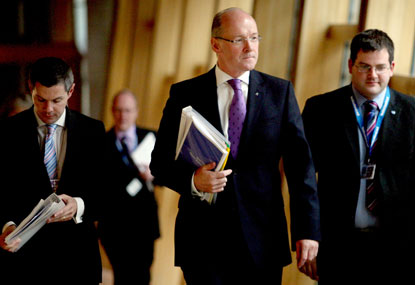Scottish Finance Secretary John Swinney is to end the public sector pay freeze and boost capital spending, he announced today in his draft Budget for 2013/14.
 Pay for government staff will rise by an average of 1% from next March, with proportionately more for those earning under £21,000 a year, and nothing for those earning above £80,000.
Pay for government staff will rise by an average of 1% from next March, with proportionately more for those earning under £21,000 a year, and nothing for those earning above £80,000.The assumption is that local authority employees will be able to negotiate similar increases, though there is no indication that this will be centrally funded. Almost £1bn has been shifted out of council budgets because of the centralisation of police and fire and rescue services.
Capital spending on construction, skills and green energy will rise by £180m over the next two years, but at the cost of tough constraints on revenue spending. Prominent among the new investments are £40m for affordable housing and £17m for the college sector, in both cases partially restoring politically unpopular cuts made last year.
There will also be an £80m acceleration of the programme to build and renovate schools using the non-profit distributing funding model, recruitment incentives for smaller companies to hire young unemployed people, the creation of an Energy Skills Academy and packages of investment in home insulation, athletics, cycling infrastructure, hybrid buses, tourism and maintaining historic buildings.
Swinney reaffirmed commitments to free personal care, free higher education, free prescriptions and the living wage, and to maintain the Scottish Government’s promise of no compulsory redundancies of its employees.
The increases in capital plans reflect squeezes across the board on revenue budgets including a £45m cut in lending to Scottish Water and continuing efficiencies driven by the Scottish Futures Trust, which was set up to find more cost-effective ways of investing in infrastructure.
Swinney urged the UK coalition government to commit to economic stimulus, given that output forecasts for the current year now ranged between 0.2% and –0.7%, against the 2.8% growth originally projected. ‘We are doing everything we can to support growth, public services and opportunities for the future, but the UK government needs to realise that more needs to be done,’ he said.
In angry Holyrood exchanges, Labour’s Ken Mackintosh accused Swinney of ‘passing the buck’ by blaming the stringencies on Westminster, and funding his capital spend by forcing cuts in local authority services. Gavin Brown for the Tories claimed that Scotland’s funding from Westminster had risen in cash terms.
The Liberal Democrats’ Willie Rennie called the package ‘timid’, while Patrick Harvie for the Scottish Greens said it was a budget the Tories would be proud of.
Kevin Keenan, finance spokesman at the Convention of Scottish Local Authorities, said there were few surprises, but that local authorities would want further talks with Swinney ahead before issues such as welfare reform would start to be felt in 2014/15.
Glasgow University’s Centre for Public Policy for Regions calculates that the Scottish budget will fall by 18% in real terms by 2016/17.
The CPPR estimates that around half the overall cuts – a third of the revenue cuts, and three-quarters of the capital budget reduction – will be completed by the end of the current fiscal year, but warns that some areas of spending face further uncertainty, notably on health, where Scotland has refused to follow English funding reforms.





















